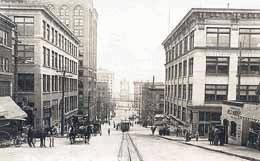On January 1, 1909, a City of Spokane ordinance prohibiting street meetings becomes effective. The ordinance is directed against street demonstrations being carred out by a militant labor union, the Industrial Workers of the World (called IWW or Wobblies), against exploitive employment agencies. Later in the year the IWW will challenge the ordinance with massive streetcorner demonstrations followed by mass arrests in what will become known as the Spokane free-speech fight.
Jobs (Very Short-lived) for Sale
Thirty-one employment agencies lined Stevens Street in Spokane. These labor agencies sold jobs, many jobs, to transient or casual workers for "a dollar a job." This job at a lumber camp or construction site, or on a railroad section gang often lasted only a day or two before the laborer was fired and replaced by a new laborer. During one winter, for example, the Somers Lumber Company hired 3,000 men to maintain a crew of 50 men. The labor agencies were the winners, but so were the anti-union employers, since it was impossible for unions to organize workers passing through for a day or two.
In the winter of 1908, the IWW began holding protest demonstrations outside the offices of these labor agencies, which they termed "sharks" or "leeches." In turn, the Associated Agencies of Spokane persuaded the City Council to pass the ordinance prohibiting street meetings. Spokane Mayor N. S. Pratt did not object.
Filling the Jails of Spokane
The IWW complied with the ordinance through the spring and summer of 1909. In August the City Council passed an amendment that permitted the Salvation Army to hold street meetings.
This was the last straw. The IWW then mounted the free-speech campaign against this obvious violation of the U.S. constitution. (The campaign was not against the amendment but against the ordinance itself.) The Wobbly's national newspaper, The Industrial Worker ran a headline: "Wanted -- Men to Fill the Jails of Spokane."
Hundreds of Wobblies from across the country poured into Spokane, including the fiery young organizer Elizabeth Gurley Flynn (1890-1964). She and many others were arrested and filled the jails of Spokane. Gradually middle-class progressives began to join the fight.
On March 9, 1910, the Spokane City Council, in a unanimous vote, repealed the ordinance.

